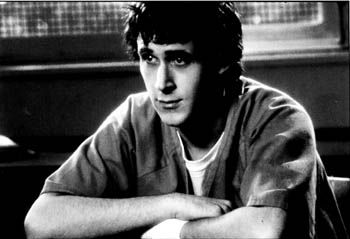![[Metroactive Movies]](/movies/gifs/movies468.gif)
[ Movies Index | Show Times | Santa Cruz Week | SantaCruz Home | Archives ]
Whydunnit?
'The United States of Leland' investigates a murder without apparent motive
By Richard von Busack
One of those lives in which the mainspring is missing, F. Scott Fitzgerald wrote--the phrase sums up the lead character in The United States of Leland. Ryan Gosling plays Leland Fitzgerald, a suburban boy from Arizona who is in jail for an inexplicable murder. While writer/director Matthew Ryan Hoge is clearly a writer first, he has been careful to make the film look impressionistic. He sums up the murder with a bicycle sprawled in the grass and a drop of blood pooling on the white-leather toe of a kid's sneaker. And in interviewing Hoge and Gosling--whose subtle yet funny acting in The Believer, Murder by Numbers and here suggests fame ahead--it seems that The United States of Leland isn't meant to harangue society. What's offered instead are possibilities of why Leland committed the crime, which he claims to have blocked from his memory.
Some motives include Leland's strained relationship with his father (Kevin Spacey, exhibiting delightful bastardry). In addition, the young killer had a tentative romance with a troubled girl Becky (Jena Malone), the sister of the victim. The mystery challenges Leland's teacher in juvenile hall, a blocked writer (Don Cheadle) who believes that if he can crack Leland, he'll have a book.
Hoge actually taught at the L.A. Juvenile Hall before he wrote the script. "These kids weren't monsters," he says. "They'd done terrible things, but they were still kids." Touring a juvenile detention center, Gosling said he was struck by "the colors. Every prison movie takes place in darkness and shadows, but the uniforms here were bright blue, orange, yellow. There was tons of sunlight, and everything was in bright contrast."
Bringing that color scheme--from the David Hockney-like vistas of the housing tracts to the almost gum-ball-machine clash of pastel colors inside the jail, Hoge's idea was "let's get this beautiful. The subject matter is easier for people if it's nicer and softer and warmer."
The United States of Leland seems like a film particularly appealing to young adults. Leland may have become a killer after that painful discovery that someone can love you and still sleep with someone else. When a young person first confronts a commonplace sin like infidelity, it feels like such a crack in the world that nothing is safe, and every crime is possible. That's the Holden Caulfieldy aspect of The United States of Leland; when you get older, Catcher in the Rye becomes a less important book because it's impossible to recapture that sense of outrage, once you become a corrupt adult, one of them.
Still, with his loose face and opaque eyes, Gosling's Leland keeps his mystery intact. He's perfect as this likable, apparently normal murderer. It's evidence of the level of humor Gosling brings to his work that, when you ask him which actors are important to him, the first name he mentions is Gene Wilder. As for what was going on in Leland's mind, he answers with a parable. "It's like what's going on when you're watching a movie," Gosling says. "You're mind's going through all these changes, but if someone looked at your face, you'd look slack. That's what Leland is doing; he's watching a movie that is his life. He wasn't in his body."
Copyright © Metro Publishing Inc. Maintained by Boulevards New Media.
For more information about Santa Cruz, visit santacruz.com.
![]()

Killing to Be Clever: Ryan Gosling's motive for mayhem remains vague in 'The United States of Leland.'
The United States of Leland (R; 104 min.), directed and written by Matthew Ryan Hoge, photographed by James Glennon and starring Ryan Gosling, Kevin Spacey and Don Cheadle, opens Friday at the Nickelodeon in Santa Cruz.
From the April 7-14, 2004 issue of Metro Santa Cruz.